情态动词
图片预览
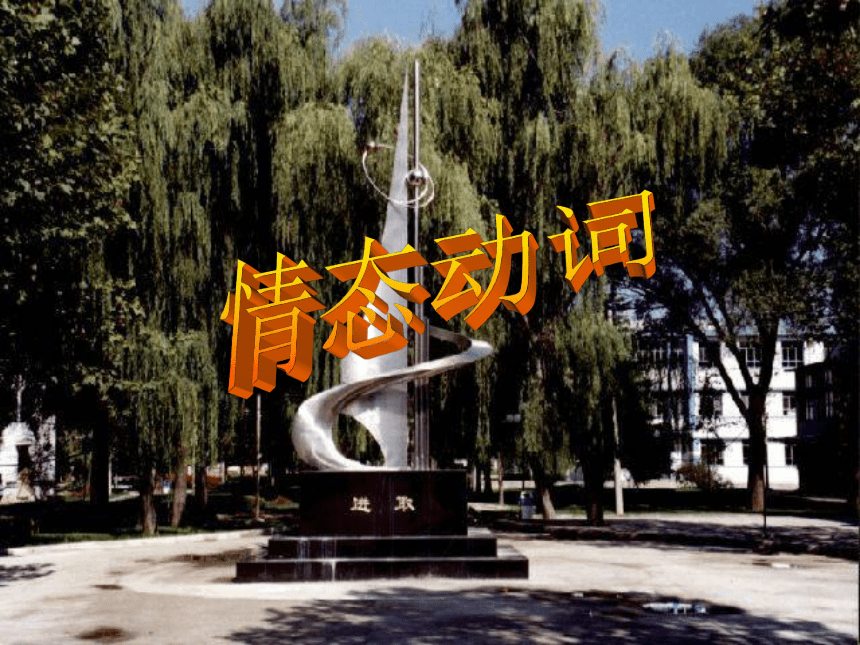
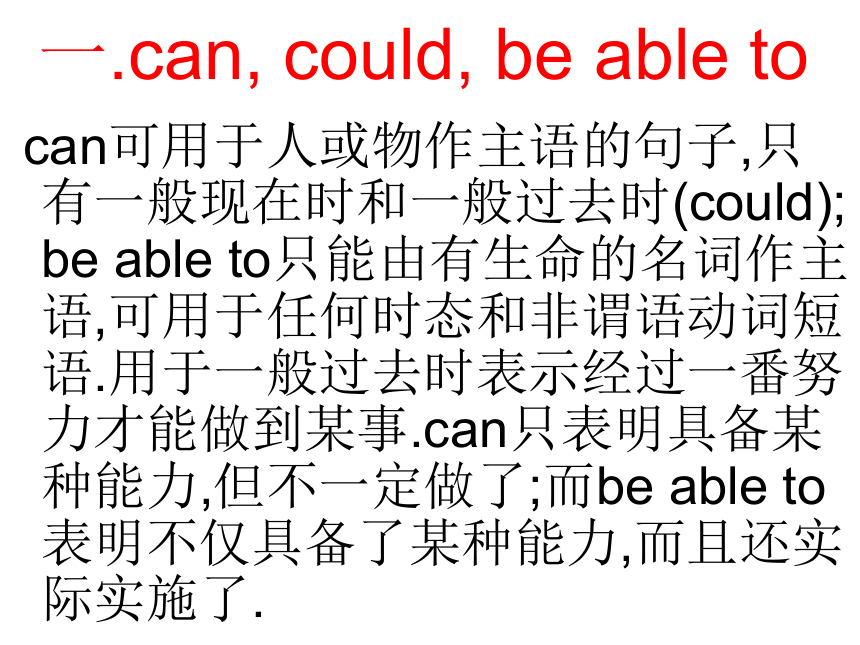
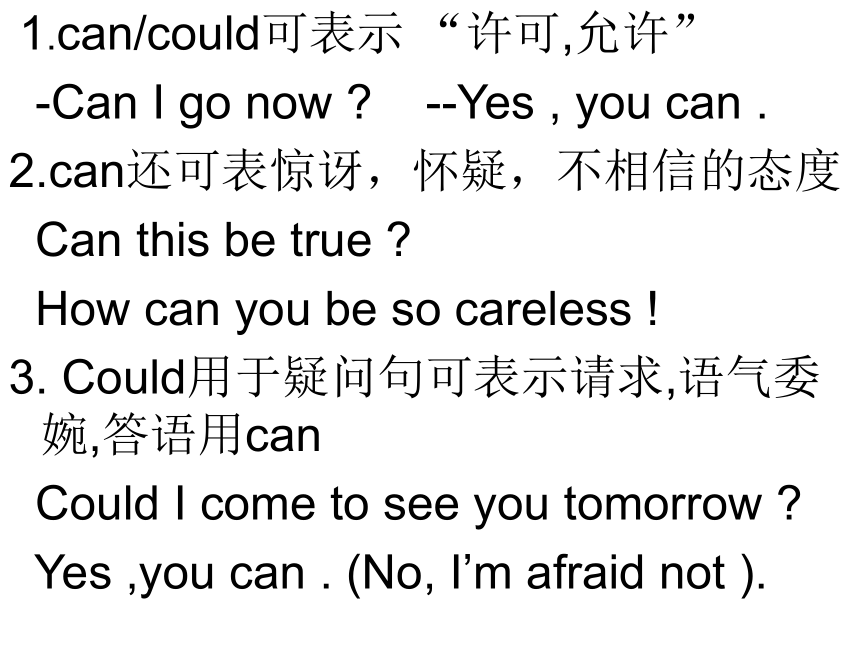
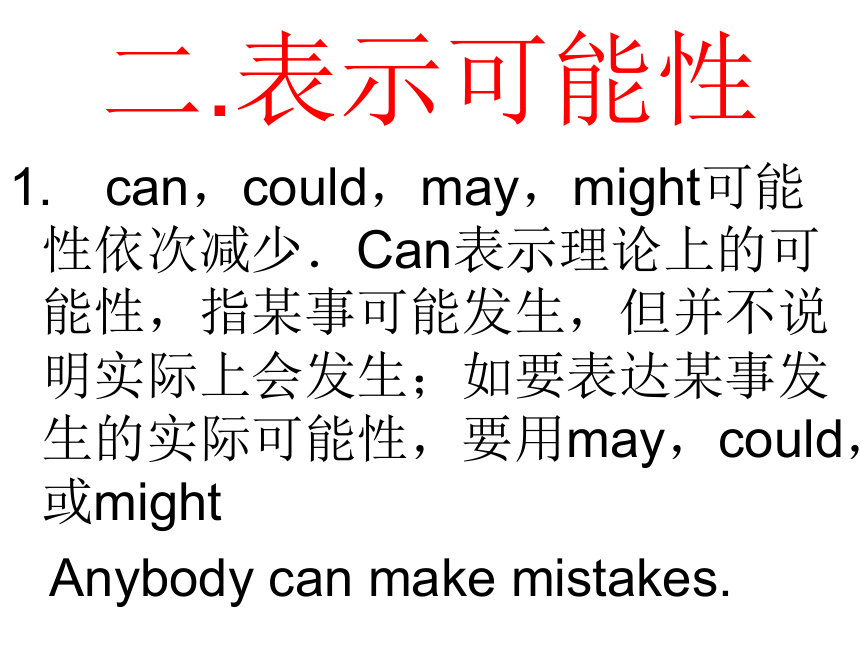

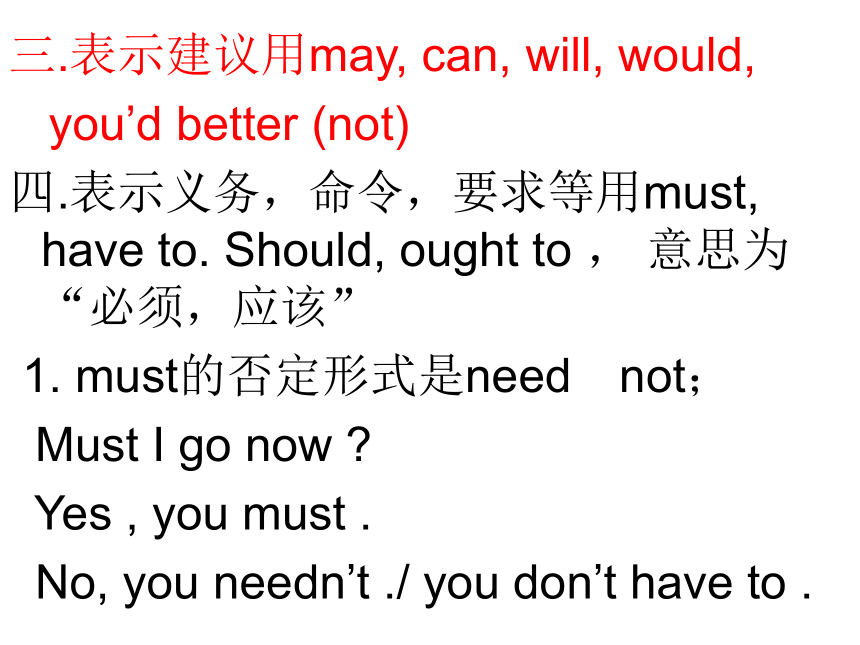
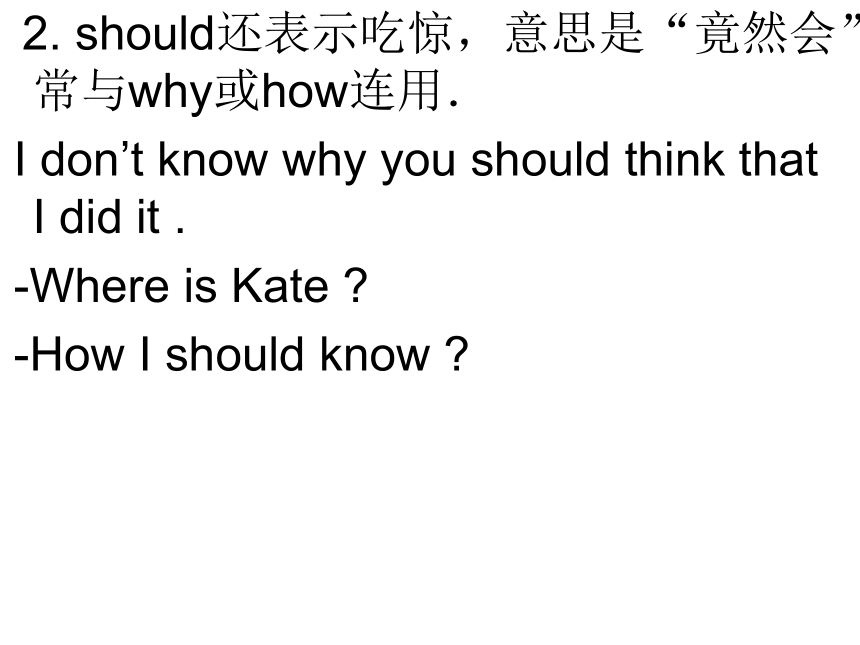
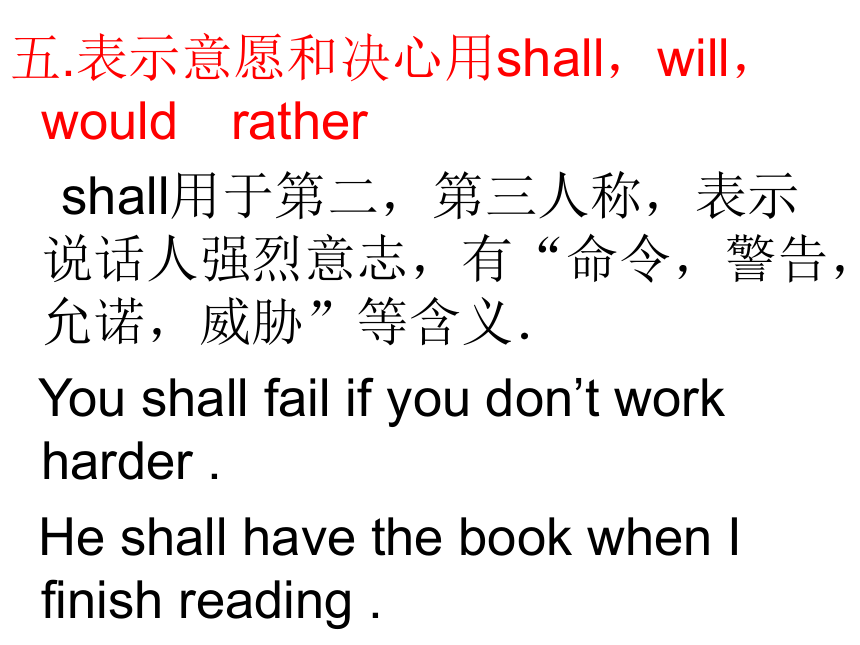
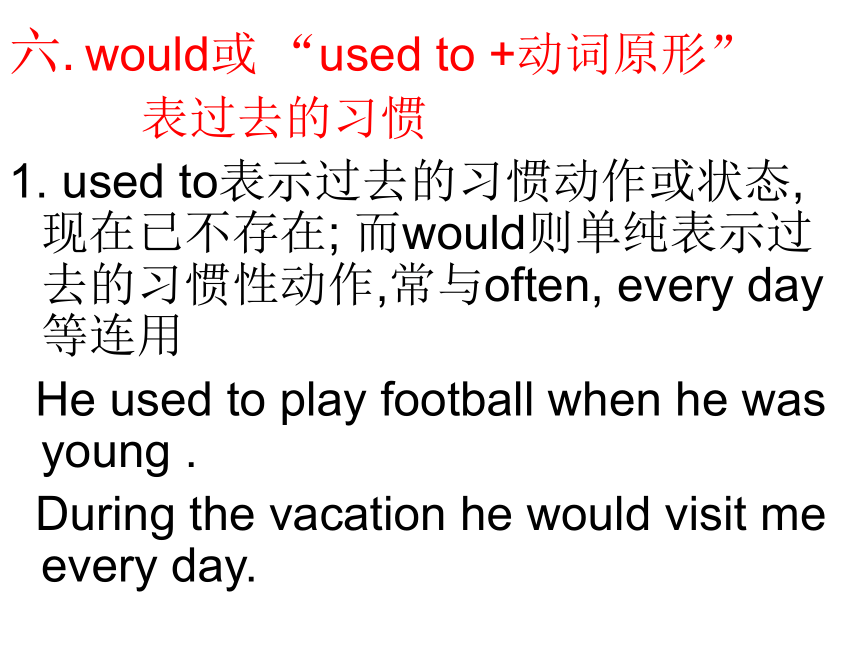
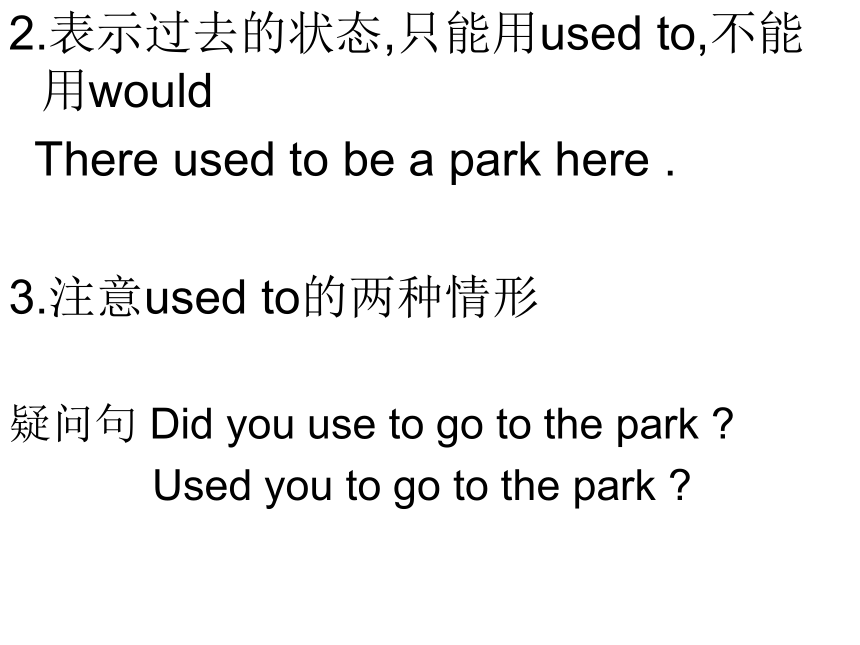
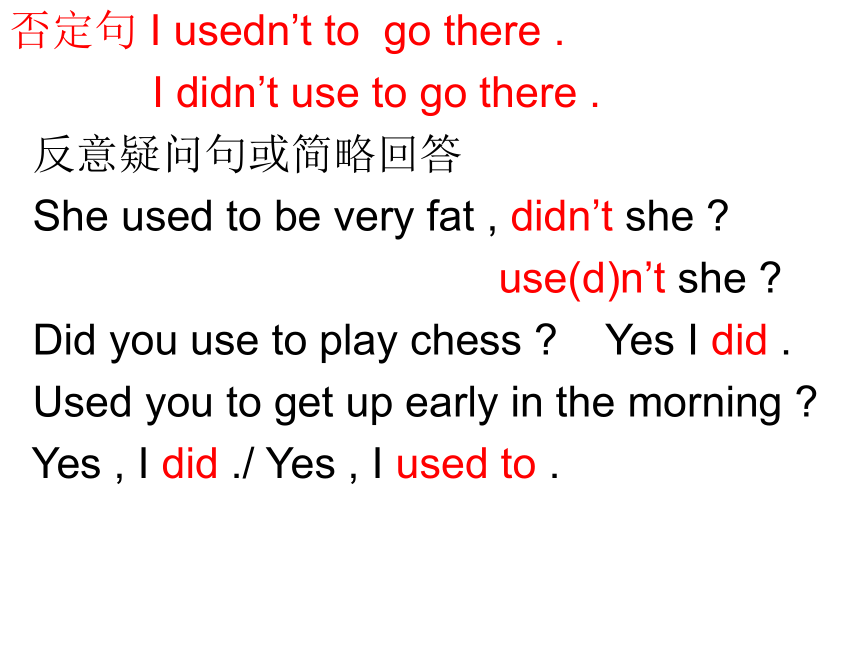
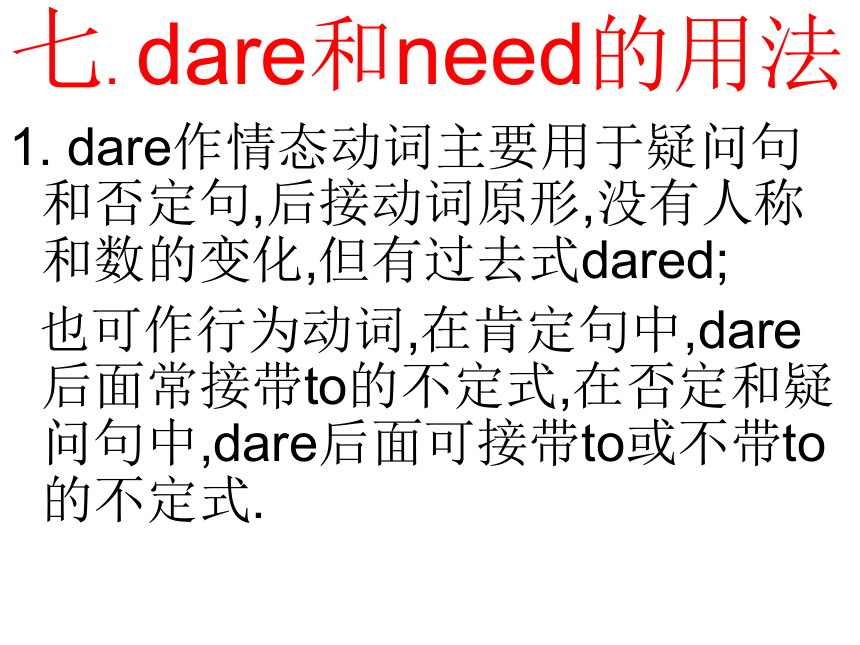
文档简介
课件32张PPT。情态动词一.can, could, be able to can可用于人或物作主语的句子,只有一般现在时和一般过去时(could); be able to只能由有生命的名词作主语,可用于任何时态和非谓语动词短语.用于一般过去时表示经过一番努力才能做到某事.can只表明具备某种能力,但不一定做了;而be able to表明不仅具备了某种能力,而且还实际实施了.
1.can/could可表示 “许可,允许”
-Can I go now ? --Yes , you can .
2.can还可表惊讶,怀疑,不相信的态度
Can this be true ?
How can you be so careless !
3. Could用于疑问句可表示请求,语气委婉,答语用can
Could I come to see you tomorrow ?
Yes ,you can . (No, I’m afraid not ).二.表示可能性1. can,could,may,might可能性依次减少.Can表示理论上的可能性,指某事可能发生,但并不说明实际上会发生;如要表达某事发生的实际可能性,要用may,could,或might
Anybody can make mistakes.2. may和might表示请求,允许时的否定回答要用mustn’t
-Might I use your pen ?
-No, you mustn’t .
3. may用于祈使句中表示祝愿
May you succeed !三.表示建议用may, can, will, would,
you’d better (not)
四.表示义务,命令,要求等用must, have to. Should, ought to , 意思为“必须,应该”
1. must的否定形式是need not;
Must I go now ?
Yes , you must .
No, you needn’t ./ you don’t have to . 2. should还表示吃惊,意思是“竟然会” 常与why或how连用.
I don’t know why you should think that I did it .
-Where is Kate ?
-How I should know ?
五.表示意愿和决心用shall,will,would rather
shall用于第二,第三人称,表示说话人强烈意志,有“命令,警告,允诺,威胁”等含义.
You shall fail if you don’t work harder .
He shall have the book when I finish reading .六. would或 “used to +动词原形”
表过去的习惯
1. used to表示过去的习惯动作或状态,现在已不存在; 而would则单纯表示过去的习惯性动作,常与often, every day等连用
He used to play football when he was young .
During the vacation he would visit me every day.2.表示过去的状态,只能用used to,不能用would
There used to be a park here .
3.注意used to的两种情形
疑问句 Did you use to go to the park ?
Used you to go to the park ?
否定句 I usedn’t to go there .
I didn’t use to go there .
反意疑问句或简略回答
She used to be very fat , didn’t she ?
use(d)n’t she ?
Did you use to play chess ? Yes I did .
Used you to get up early in the morning ?
Yes , I did ./ Yes , I used to .七. dare和need的用法
1. dare作情态动词主要用于疑问句和否定句,后接动词原形,没有人称和数的变化,但有过去式dared;
也可作行为动词,在肯定句中,dare后面常接带to的不定式,在否定和疑问句中,dare后面可接带to或不带to的不定式.
He daren’t speak English before such a crowd, dare he ?
I dare to swim across this river .
He does not dare (to) answer .
Don’t you dare (to) touch it !2. need作情态动词时,没有人称时态的变化,后接动词原形, 多用于疑问句和否定句;need作行为动词时,后接名词,代词或带to的不定式
-Need I come ?
-Yes, you must .
You don’t need to do it yourself .八.情态动词+have+ V-ed1.must/can’t/could/may/might/ should + have+ done可表示对过去的推测
2.注意:can 不用于肯定句; may不用于疑问句;should可用于表将来的推测3. “should/ought to+have+V-ed”意为 “本应该”,表示过去应该做而没有做的事,也可表示惊讶,赞叹等情绪
You should have started earlier .
“shouldn’t/ought not to+have+V-ed”意思 “本不应该”,表示过去不应该做某事但却做了.
You shouldn’t have given him the key .4.“could+have+V-ed”意思 “本能够,本可以”,表示过去本可以做某事,但却没做.
I could have finished my work yesterday
5.“needn’t+have+V-ed”意思 “本没必要”,表示过去本没有必要做某事,但却做了.
She needn’t have come yesterday .
但 “did not need to+动词原形”表示过去不必要做某事而实际上也没有做.
She didn’t need to come yesterday .
九.其他结构
can’t too…to无论怎样也不过分,
越….越好
may/might as well 还是做….的好
would rather…than宁愿做…也不愿做...
can’t help doing 情不自禁做某事
但can’t help to do sth不能帮忙做某事1.You__ return the book now . You can keep it till next week .
A. can’t B. mustn’t
C. needn’t D. may not
2.Where is my pen ? I___ it .
A. might lose B. would have lost
C. Should have lost D. must have lost
3.I didn’t hear the phone . I __asleep .
A. must be B. must have been
C. Should be D. should have been D B C4. A computer __think for itself , it must be told what to do .
A. can’t B. couldn’t
C. may not D. might not
5.Janny __have kept her word . I wonder why she changed her mind .
A. must B. should C. need D. would A B6. He __come with us tonight ,but he isn’t very sure yet.
A. must B. may C. can D. will
7. We __last night , but we went to the concert instead .
A. must have studied B. might study
C. should have studied D.would study
C B8.-Could I borrow your dictionary ?
-Yes , of course you____ .
A. might B. will C. can D. should
9.Tom ought not to __me your secret ,
but he meant no harm .
A. have told B. tell
C. be telling D. having told C A10.I told Sally how to get here, but perhaps I __it out for her .
A. had to write B. must have written C. should have written
D. ought to write
11.It’s nearly seven o’clock . Jim __be here at any moment .
A. must B. need C. should D. can C C12.Tom,you__leave all your clothes on the floor like this .
A. wouldn’t B. mustn’t
C. needn’t D. may not
13.John, look at the time. __you play the piano at such a late hour ?
A. Must B. Can C. May D. Need A B14.He paid for a seat, when he __have entered free.
A. could B. would C. must D. need
15.I__have been more than six years old when the accident happened .
A. shouldn’t B. couldn’t
C. mustn’t D. needn’t
B A16.The cake is very sweet . You__ a lot of sugar in it .
A. should put B. could have put
C. might put D. must have put
17.-Tom is never late for work .Why is he absent today ?
-Something ___to him .
must happen
B. should have happened
C. could have happened
D. must have happened D D18.-Lucy doesn’t mind lending you her dictionary .
-She __, I’ve already borrowed one.
A. can’t B. mustn’t
C. needn’t D. shouldn’t
19.There __be any difficulty about passing the road test since you have practised a lot in the driving school .
A. mustn’t B. shan’t
C. shouldn’t D. needn’t C C20.-I’ve taken someone else’s green sweater by mistake .
-It __Harry’s . He always wears green.
A. has to be B. will be
C. mustn’t be D. could be
21.-Is there an express to Beijing tonight?
-There __be ;I’ll ring the railway station and find it out .
A. will B. can C. might D. need D C22.-Mom, I have broken my train .
-I told you so . You ___on it .
A. mustn’t have ridden B. couldn’t ride
C. shouldn’t have ridden D. needn’t ride
23.-Jim! Did you have a good time at the party ?
-Yes, but I really __, because I had lots of work to do .
A. needn’t have B. mustn’t
C. shouldn’t have D. shouldn’t C C24.-Have you heard the terrorists were driven out of the country ?
-Yes. __peace return to the troubled land.
Will B. Shall C. Can D. May
25. Even though I’d hurt my leg ,
I ____finish the whole distance .
A. could B. had to
C. might D. was able toD D26.-Well, lost again !
-It is not very important . We ___forget about it . OK ?
A. can’t B. may as soon
C. might as well D.ought to have had to
27.If you listen to me, you __get that cartoon book , my dear .
A. will B. shall C. must D. mayCB
1.can/could可表示 “许可,允许”
-Can I go now ? --Yes , you can .
2.can还可表惊讶,怀疑,不相信的态度
Can this be true ?
How can you be so careless !
3. Could用于疑问句可表示请求,语气委婉,答语用can
Could I come to see you tomorrow ?
Yes ,you can . (No, I’m afraid not ).二.表示可能性1. can,could,may,might可能性依次减少.Can表示理论上的可能性,指某事可能发生,但并不说明实际上会发生;如要表达某事发生的实际可能性,要用may,could,或might
Anybody can make mistakes.2. may和might表示请求,允许时的否定回答要用mustn’t
-Might I use your pen ?
-No, you mustn’t .
3. may用于祈使句中表示祝愿
May you succeed !三.表示建议用may, can, will, would,
you’d better (not)
四.表示义务,命令,要求等用must, have to. Should, ought to , 意思为“必须,应该”
1. must的否定形式是need not;
Must I go now ?
Yes , you must .
No, you needn’t ./ you don’t have to . 2. should还表示吃惊,意思是“竟然会” 常与why或how连用.
I don’t know why you should think that I did it .
-Where is Kate ?
-How I should know ?
五.表示意愿和决心用shall,will,would rather
shall用于第二,第三人称,表示说话人强烈意志,有“命令,警告,允诺,威胁”等含义.
You shall fail if you don’t work harder .
He shall have the book when I finish reading .六. would或 “used to +动词原形”
表过去的习惯
1. used to表示过去的习惯动作或状态,现在已不存在; 而would则单纯表示过去的习惯性动作,常与often, every day等连用
He used to play football when he was young .
During the vacation he would visit me every day.2.表示过去的状态,只能用used to,不能用would
There used to be a park here .
3.注意used to的两种情形
疑问句 Did you use to go to the park ?
Used you to go to the park ?
否定句 I usedn’t to go there .
I didn’t use to go there .
反意疑问句或简略回答
She used to be very fat , didn’t she ?
use(d)n’t she ?
Did you use to play chess ? Yes I did .
Used you to get up early in the morning ?
Yes , I did ./ Yes , I used to .七. dare和need的用法
1. dare作情态动词主要用于疑问句和否定句,后接动词原形,没有人称和数的变化,但有过去式dared;
也可作行为动词,在肯定句中,dare后面常接带to的不定式,在否定和疑问句中,dare后面可接带to或不带to的不定式.
He daren’t speak English before such a crowd, dare he ?
I dare to swim across this river .
He does not dare (to) answer .
Don’t you dare (to) touch it !2. need作情态动词时,没有人称时态的变化,后接动词原形, 多用于疑问句和否定句;need作行为动词时,后接名词,代词或带to的不定式
-Need I come ?
-Yes, you must .
You don’t need to do it yourself .八.情态动词+have+ V-ed1.must/can’t/could/may/might/ should + have+ done可表示对过去的推测
2.注意:can 不用于肯定句; may不用于疑问句;should可用于表将来的推测3. “should/ought to+have+V-ed”意为 “本应该”,表示过去应该做而没有做的事,也可表示惊讶,赞叹等情绪
You should have started earlier .
“shouldn’t/ought not to+have+V-ed”意思 “本不应该”,表示过去不应该做某事但却做了.
You shouldn’t have given him the key .4.“could+have+V-ed”意思 “本能够,本可以”,表示过去本可以做某事,但却没做.
I could have finished my work yesterday
5.“needn’t+have+V-ed”意思 “本没必要”,表示过去本没有必要做某事,但却做了.
She needn’t have come yesterday .
但 “did not need to+动词原形”表示过去不必要做某事而实际上也没有做.
She didn’t need to come yesterday .
九.其他结构
can’t too…to无论怎样也不过分,
越….越好
may/might as well 还是做….的好
would rather…than宁愿做…也不愿做...
can’t help doing 情不自禁做某事
但can’t help to do sth不能帮忙做某事1.You__ return the book now . You can keep it till next week .
A. can’t B. mustn’t
C. needn’t D. may not
2.Where is my pen ? I___ it .
A. might lose B. would have lost
C. Should have lost D. must have lost
3.I didn’t hear the phone . I __asleep .
A. must be B. must have been
C. Should be D. should have been D B C4. A computer __think for itself , it must be told what to do .
A. can’t B. couldn’t
C. may not D. might not
5.Janny __have kept her word . I wonder why she changed her mind .
A. must B. should C. need D. would A B6. He __come with us tonight ,but he isn’t very sure yet.
A. must B. may C. can D. will
7. We __last night , but we went to the concert instead .
A. must have studied B. might study
C. should have studied D.would study
C B8.-Could I borrow your dictionary ?
-Yes , of course you____ .
A. might B. will C. can D. should
9.Tom ought not to __me your secret ,
but he meant no harm .
A. have told B. tell
C. be telling D. having told C A10.I told Sally how to get here, but perhaps I __it out for her .
A. had to write B. must have written C. should have written
D. ought to write
11.It’s nearly seven o’clock . Jim __be here at any moment .
A. must B. need C. should D. can C C12.Tom,you__leave all your clothes on the floor like this .
A. wouldn’t B. mustn’t
C. needn’t D. may not
13.John, look at the time. __you play the piano at such a late hour ?
A. Must B. Can C. May D. Need A B14.He paid for a seat, when he __have entered free.
A. could B. would C. must D. need
15.I__have been more than six years old when the accident happened .
A. shouldn’t B. couldn’t
C. mustn’t D. needn’t
B A16.The cake is very sweet . You__ a lot of sugar in it .
A. should put B. could have put
C. might put D. must have put
17.-Tom is never late for work .Why is he absent today ?
-Something ___to him .
must happen
B. should have happened
C. could have happened
D. must have happened D D18.-Lucy doesn’t mind lending you her dictionary .
-She __, I’ve already borrowed one.
A. can’t B. mustn’t
C. needn’t D. shouldn’t
19.There __be any difficulty about passing the road test since you have practised a lot in the driving school .
A. mustn’t B. shan’t
C. shouldn’t D. needn’t C C20.-I’ve taken someone else’s green sweater by mistake .
-It __Harry’s . He always wears green.
A. has to be B. will be
C. mustn’t be D. could be
21.-Is there an express to Beijing tonight?
-There __be ;I’ll ring the railway station and find it out .
A. will B. can C. might D. need D C22.-Mom, I have broken my train .
-I told you so . You ___on it .
A. mustn’t have ridden B. couldn’t ride
C. shouldn’t have ridden D. needn’t ride
23.-Jim! Did you have a good time at the party ?
-Yes, but I really __, because I had lots of work to do .
A. needn’t have B. mustn’t
C. shouldn’t have D. shouldn’t C C24.-Have you heard the terrorists were driven out of the country ?
-Yes. __peace return to the troubled land.
Will B. Shall C. Can D. May
25. Even though I’d hurt my leg ,
I ____finish the whole distance .
A. could B. had to
C. might D. was able toD D26.-Well, lost again !
-It is not very important . We ___forget about it . OK ?
A. can’t B. may as soon
C. might as well D.ought to have had to
27.If you listen to me, you __get that cartoon book , my dear .
A. will B. shall C. must D. mayCB
